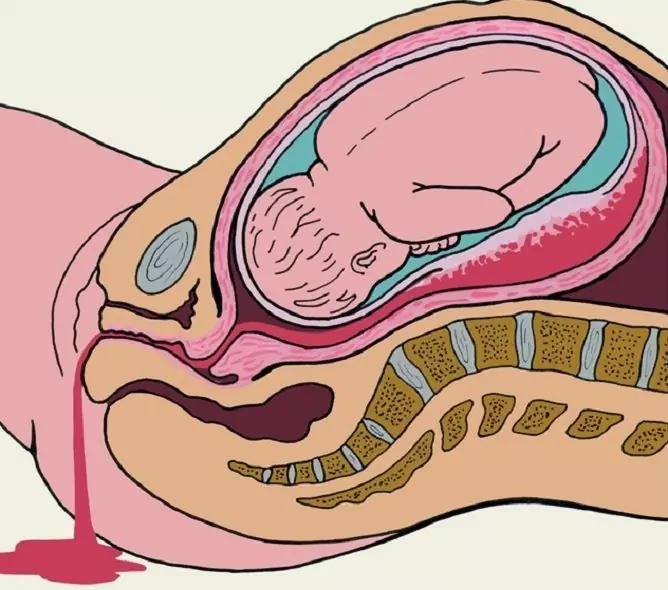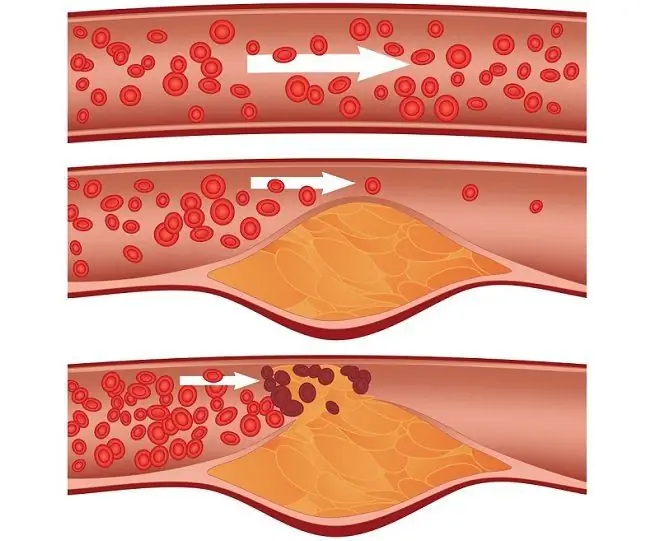- Author Rachel Wainwright wainwright@abchealthonline.com.
- Public 2023-12-15 07:39.
- Last modified 2025-11-02 20:14.
Cachexia

Cachexia is a state of extreme exhaustion of the body. Pathology is characterized by general weakness, a sharp progressive decrease in body weight and a slowdown in all physiological processes. These disorders are accompanied by asthenia, depression and other mental changes. Cachexia can be either an independent lesion or a complication of various diseases, and requires immediate medical attention.
Symptoms of cachexia
Cachexia is accompanied by the following symptoms:
- Rapid weight loss up to 50% of body weight and more;
- Muscle weakness;
- Dehydration;
- Sleep disturbance;
- Decrease in blood pressure;
- Infection tendency;
- Loss of legal capacity.
When exhausted, the skin loses its elasticity, becomes flabby, and also turns pale or takes on an earthy tint. This is due to dehydration, vitamin deficiency and the disappearance of subcutaneous tissue. Trophic changes in nails and hair are observed, stomatitis develops.
For cachexia, various disorders of the functions of the gastrointestinal tract and genitourinary system are characteristic. In women, amenorrhea appears due to a decrease in the volume of circulating blood. Avitaminosis is expressed mainly in hypoproteinemia, hypoalbuminemia, iron and vitamin B12 deficiency.
In addition to the listed lesions, the depletion of the body is accompanied by various mental disorders. With asthenia, irritability, tearfulness and a subdepressive state appear, which, as the pathology develops, are replaced by lethargy, apathy and lack of physical strength. In cases of exacerbation of the underlying disease that caused cachexia, confusion in the form of amentive syndrome, as well as rudimentary or severe delirium, may appear. Often, exhaustion is accompanied by anxious and melancholy states, apathetic stupor, pseudo-paralytic syndrome, or other forms of mental disorders. Even if the cause of exhaustion has been eliminated, asthenia continues to be present for a long period.
Causes of cachexia
The set of reasons contributing to the development of cachexia can be conditionally divided into five groups:
- Deficiency of nutrients in the body due to starvation, diseases of the esophagus, teeth or oral cavity;
- Insufficient absorption of useful elements due to diseases of the stomach and intestines, as well as operations on these organs;
- Increased need for proteins, fats and carbohydrates during rehabilitation after severe injuries or in the postoperative period;
- Rapid loss of vitamins and minerals in case of kidney damage or massive burn damage to tissues;
- Acceleration of metabolic processes due to endocrine system failures, heart failure, infections.
Depletion is primary and secondary. The main causes of primary, or pituitary cachexia, are the following disorders:
- Brain trauma;
- Prolonged psychogenic stress;
- Anorexia;
- Tumor or systemic damage to the pituitary gland;
- Autoimmune hypophysitis;
- Chronic specific infection;
- Hemorrhage;
- Embolism.
Secondary, or symptomatic type of wasting is due to the following factors:
- Malabsorption;
- Hypoinsulinism;
- Deficiency of glucocorticoids;
- Increased synthesis of glucagon;
- Excessive production of somatostatin;
- Growth of neoplasms.
Pituitary cachexia
Pituitary cachexia, or Simmonds syndrome, is a pathology caused by lesions of the base of the brain, which lead to the development of functional hypothalamic-pituitary insufficiency. The main clinical manifestation is severe exhaustion in combination with senile involution of organs and tissues. The etiology of the disease, in addition to infection of the pituitary gland, includes tuberculosis, syphilis, necrosis after hemorrhage or embolism, sclerosis, tumor.
Usually, pituitary cachexia is slow and may go undiagnosed for years. But in some cases, depending on the nature of the lesion of the pituitary gland, all symptoms progress rapidly, and without treatment, cachexia leads to coma and death.
According to statistics, the disease occurs mainly in women 30-40 years old. The first sign is a violation of the menstrual cycle, up to the complete disappearance of menstruation. Then depletion develops, secondary sexual characteristics disappear, internal organs atrophy, and mental health is also impaired.
In the treatment of cachexia of this type, hormone replacement therapy is used:
- Adrenocorticotropic hormone;
- Deoxycorticosterone;
- Sex hormones;
- Prednisolone and other glucocorticoids.

In addition, physiological saline, glucose solution, vitamins are injected and provide high-calorie nutrition and rest.
Cancer cachexia
Cancer cachexia is the depletion of the body against the background of the development of a malignant tumor. For the development of pathology, the localization and volume of the neoplasm does not matter, although with tumors of the gastrointestinal tract, depletion is more pronounced. Cancer cachexia is believed to be associated with the following:
- Atypical metabolism, which leads to a high need for tumor tissue in substrates used for its growth;
- The toxic effect of a tumor on the structure and function of healthy organs and tissues.
As a result, the disease leads to irreversible deviations of homeostasis and death.
Treatment of cachexia in a malignant tumor is symptomatic. In particular, delta-9-tetrahydrocannabinol is used as an antiemetic, including after chemotherapy, since medical cannabinoids significantly stimulate appetite and weight gain. With the help of fish oil, in some cases, weight loss is also stopped, but in general this area of oncology has not been sufficiently researched.
YouTube video related to the article:
The information is generalized and provided for informational purposes only. At the first sign of illness, see your doctor. Self-medication is hazardous to health!






